JUDY WOODRUFF: Now to a topic we don't often cover on the "NewsHour," but one that matters to millions of American women. It is lingerie and the change in direction announced this week by the country's largest brand for lingerie, Victoria's Secret. Its reputation was built on creating a sexy, yet accessible fantasy. But critics say that fantasy was targeted toward men, not women. The company announced a sweeping overhaul yesterday that it says will better reflect the times and what women want. Gone is its stable of Angels, the supermodels who starred in glossy ads and its annual big-budget fashion show. The new faces of the brand are women who don't fit the traditional Victoria's Secret mold. Vanessa Friedman is The New York Times' fashion editor and chief fashion critic, and she joins me now. Vanessa Friedman, welcome to the "NewsHour." So, I saw that the headline on your article referred to Victoria's Secret as the embattled company. Why are they making this move now?
VANESSA FRIEDMAN, Fashion Editor, The New York Times: I mean, they clearly have realized that they are deeply out of step with the cultural tenor of the times. They are a company that came to represent sizes and racism, sexism, and this is a time when all of those things are on the wane. Inclusivity and diversity are on the rise, and people are speaking up and demanding that you know what they buy reflects their values.
JUDY WOODRUFF: And we went and looked at some of the things you have written in the past about the company over the years. And we saw that, what, three years ago, you were commenting on their season rollout of fashion that year, and you said they are catering to an era on its way to extinction. So, have they past -- are they long past the time when they should have made these changes?
VANESSA FRIEDMAN: Certainly, I think they feel that way. And most of their critics would say they certainly have been. That was actually their last fashion show. It took place in 2018. And they say they will bring it back in some form. It is going to look very different. You know, what's fascinating to me is, Victoria's Secret was literally founded as a store that men could feel comfortable in buying lingerie for their girlfriends. So it was founded for men, as much as women.
JUDY WOODRUFF: Tell us a little more, Vanessa Friedman, about why Victoria's Secret has been as successful as it's been. As we said at the outset, they are the most -- they're the largest women's lingerie brand. Why have they been as successful as they have been?
VANESSA FRIEDMAN: They're enormously dominant in their sector. And they sell still over $5 billion of lingerie a year. So, they're certainly something to be reckoned with. They understood, I think, very early on that they could use a lot of the cultural currents that were -- that were coming up in the early '90s, whether that was reality TV, or sex tapes, or irony, kitsch, kind of the fun of dressing up, and create a sort of form of entertainment out of that, which would then sell their products. And that TV show, the fashion show, was incredibly popular. It aired around the world in hundreds of countries. And millions of people watched it. So, it did -- it worked for a very long time. But when it stopped working, it took them, I think, also a long time to realize it.

JUDY WOODRUFF: Describe the kind of pressure they're feeling right now in the marketplace.
VANESSA FRIEDMAN: Well, their sales have slipped. I mean, that's partly due to COVID. They have gone from $7 billion to $5 billion in sales. And there is a real outcry now among consumers, particularly women, for clothing that reflects who they are and caters to what they need, what women want, as opposed to what men want. And so they're feeling that pressure. And then there's the whole Epstein relationship, which has created -- cast a real cloud over the brand. The former chairman Les Wexner was very close to Jeffrey Epstein. And that's put them in the news in a way that probably is not particularly helpful for them.
JUDY WOODRUFF: A lot of turmoil with that company. And Victoria's Secret has split off from the parent company. So, what, in the end, Vanessa Friedman, determines whether this is a successful move or not?
VANESSA FRIEDMAN: The consumer will tell. Will women buy this switcheroo? Will they buy the fact that, instead of an Angel, you have a soccer star? You have Megan Rapinoe, or you have Eileen Gu, the Olympian freestyle freestyle skier. You have got Paloma Elsesser, who's a real advocate for body inclusivity. Will women believe that switch or not? Remains to be seen.
JUDY WOODRUFF: And, presumably, this is not the only company going through something like this?
VANESSA FRIEDMAN: No, but it is the most extreme example, I think, of a company that really represented one specific set of values, which had to do with objectifying women and the male gaze, trying to very quickly switch to becoming what the CEO says is the world's leading advocate for women. It's a pretty big switch.
JUDY WOODRUFF: A pretty big -- pretty big switch. Vanessa Friedman, who is The New York Times fashion editor and chief fashion critic, thank you very much.
VANESSA FRIEDMAN: Thank you.











